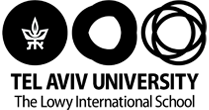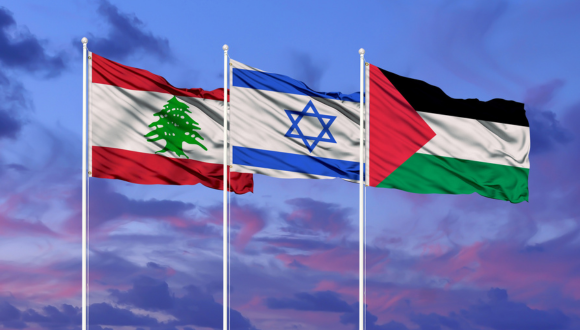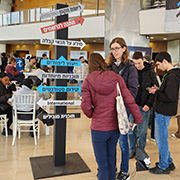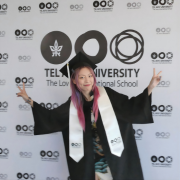A Quiet Revolution
The initiatives and people at TAU working towards peace
Thirty years ago, when Tel Aviv University’s (TAU’s) Peace Index and the Konrad Adenauer Program for Jewish-Arab Cooperation were first created, Israelis and Palestinians had entered a period of unmatched hope following the 1993 signing of the Oslo Accords—an unprecedented pair of interim agreements between Israel and the Palestinian Authority, which set the groundwork for peace.
In the years and decades following, in addition to research initiatives, TAU also introduced educational degrees related to regional conflict resolution and diplomacy. And today, while peace increasingly seems an impossible dream, TAU’s peace and diplomacy programs continue to quietly and persistently lay the groundwork for change.
Taking the Pulse of Society—the Peace Index at 30 Years
Born in 1994, the Peace Index was initially conceived to chronicle the shifting sands of Israeli public opinion following the signing of the Oslo Accords; initiated by Prof. Ephraim Yuchtman-Ya’ar and Prof. Tamar Hermann, the intent was to monthly poll a representative sample of the adult Israeli public on the hopes, skepticism and beliefs related to peace in the region. Today, its decades of data serve as one of the most prominent records of the contemporary Israel-Palestine story and conflict.
“We’re talking about 30 years of data,” says Dr. Nimrod Rosler, who, along with Dr. Alon Yakter, directs the Peace Index.
“The unique contribution is its ability to monitor trends over time, telling us how public opinion has responded to changing circumstances, whether it’s war, a peace initiative, or October 7...”
Rosler states that, in the beginning years, the polls revealed a lot of enthusiasm about the peace process and received significant media attention, including via a monthly column in Haaretz, Israel’s longest-running newspaper, and later in the popular Ynet news portal. As the political possibility of peace shifted with the onset of the Second Intifada in 2000, the index too evolved; direct questions about the Oslo Accords were no longer included, and the index instead focused more generally on the support for negotiations with the Palestinian Authority and the belief about whether such negotiations could lead to peace.
“There was a lot of disappointment and despair regarding the peace process when the Second Intifada took place, and by 2007 there were young people who didn’t even know what the Oslo Accords were,” reflects Rosler, who is also the head of TAU’s international MA program in Conflict Resolution and Mediation.
Another key change was the creation of the Israeli-Palestinian Pulse—a collaboration with Dr. Khalil Shikaki from the Palestinian Center for Policy and Survey Research in Ramallah—that for several years has tried to provide both Israeli and Palestinian perceptions on particular issues related to peace, with the latest issue being released this past September.
Today, Rosler acknowledges that, following the October 7 attacks, public support for peace is at an all-time low. Yet, even in such a dark moment, he firmly believes the index remains an important tool for understanding how attitudes shift and what factors could lead to renewed dialogue.
Additionally, for Rosler, international involvement—including from researchers, policymakers and multinational organizations—is critical; he draws a parallel to the peace process in Northern Ireland, where sustained, multi-faceted engagement eventually bore fruit.
“In conflicts like these, only multi-level efforts can work. And from the bottom-up, meaning grassroots activities, mid-level efforts from religious and community leaders, people from the media … this could push decision-makers towards a constructive dialogue.”
Rosler invites interested parties from around the world to engage with the dataset, which—in recognition of its 30th anniversary—is being made much more accessible. For the 30th anniversary, the Peace Index is being made available online (with thanks to Sergei Tishkevich), with tools that allow users to explore trends across demographics.
“We’re committed to an open data set,” says Rosler. “Researchers can approach us, and we’ll help them find exactly what they need. We want this data to be used—not just by academics but by anyone interested in advancing peace.”
The Konrad Adenauer Program—From 1995 to Today
The Konrad Adenauer Program for Jewish-Arab Cooperation is another peace-focused program that has been in existence for approximately 30 years (its 30-year anniversary will be this summer). When the program was formed, the intent was to focus on something receiving far less attention in the mid-90s peace negotiations: Jewish Israeli and Arab Israeli relations (approximately 20% of citizens in Israel are Palestinian/Arab). “In the mid-1990s, everyone was talking about peace between Israel and the Palestinians,” reflects Dr. Arik Rudnitzky, the head of the program and a specialist in Arab Israeli issues. “But few were talking about the complexities of Jewish and Arab relations within Israel itself.”
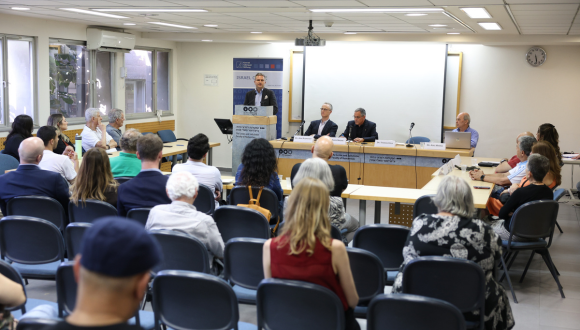
Onlookers take in a presentation during the Konrad Adenauer Program’s conference, “The Palestinian-Arab in Israel and the Palestinian Issue.”
After a conference focused on Arab and Jewish Israeli relations revealed the need for further discussions, the program was established in 1995 and has been operated by the German Konrad Adenauer Foundation. “What began as a one-time event quickly revealed fertile ground for deeper exploration,” Rudnitzky says.
The program began offering conferences, public lectures, polling, and workshops, as well as publications on Arab society and Arab-Jewish relations in Israel, such as the Bayan quarterly.
As sentiment in Israel shifted, and Israeli society became more divided between Jews and Arabs during the Second Intifada, the program ramped up its activities, hosting public forums, publishing research and fostering conversations that were otherwise absent from the public sphere. “The events of October 2000 were a turning point,” Rudnitzky says.
“People understood the acuteness of the relations between Jews and Arabs, and these were the heydays of the program, as measured by the amount of conferences and publications that we shared with the public.”
By the second decade of the 2000s, the program began introducing more on-campus activities and degree programs, as well as Jewish-Arab workshops. And, during COVID, the program adapted and expanded its reach via digital platforms, such as Muntada: a forum for discussion on Arab society and current affairs. Through online forums, the program has drawn participants from across Israel, and its sessions have tackled sensitive topics, including the repercussions of the October 7 Hamas attacks. “We held a discussion last November, one-and-a-half months after the attacks, and it was quite tense,” reflects Rudnitzky.
“We had more than 100 participants when usually we have between 30 to 60 … it was a good reminder of how we could use the platform to enhance mutual democratic discourse in Israel.”
Since then, the program has been focused more on in-person events, such as an academic roundtable in June that brought together professors, students, the general public, media, and representatives from embassies and foreign institutes.
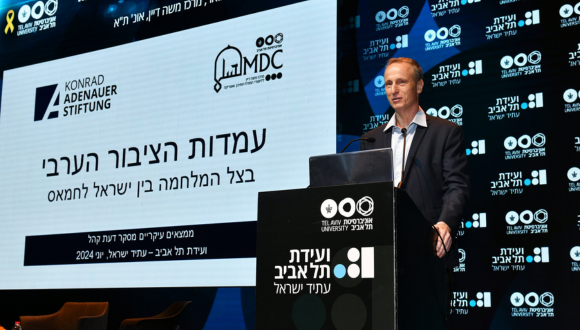
Rudnitzky presents findings from a public opinion poll of Arab citizens in Israel at a recent conference held at Tel Aviv University.
A defining feature of the Konrad Adenauer Program has also been its commitment to research. By conducting annual public opinion polls, it has, like the Peace Index, created a valuable database reflecting Jewish-Arab relations, which is accessible to the public and used by policymakers, academics, and international organizations alike.
“We position ourselves as non-biased and this is important … we are academic in how we treat the issue and people can argue with our findings, but they cannot argue our methodology.”
As the program prepares to mark its 30th anniversary, plans are underway for a major international event that will bring together German and Israeli academics, policymakers, and civil society leaders. While the program is facing a milestone, the program’s mission remains unchanged. “We are considered by many as an academic, reliable institution; I receive this feedback from all over the political spectrum,” says Rudnitzky. “This is what makes me proud.”
Supporting the Next Generation of Leaders
Another way in which TAU’s academic environment is responding to the wider political reality of the region is through several of its degree programs, including its international degree programs in English—like the MA in Security & Diplomacy, the MA in Social and Policy Aspects of Climate Change, as well as the Conflict Resolution & Mediation graduate program.
In many cases, through these programs, students are introduced to an infrastructure of non-profit organizations working to better the region, and they learn on-the-ground approaches for improving local conditions and relations. Many find themselves, after the program, with a renewed dedication to effecting positive change.
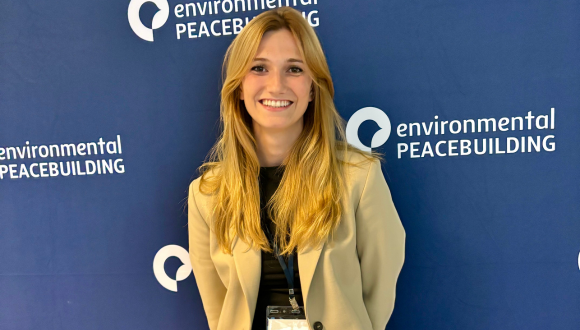
Fassbender is one of the first students in the new Conflict and Resolution PhD Program at TAU.
Francesca Yahoo Fassbender, from Germany, is one of these students. While Fassbender’s background is in economics, her experience with the Conflict Resolution and Mediation MA program, paired with her internship at EcoPeace Middle East, inspired her to pursue her doctorate within the recently launched Conflict Resolution and Mediation PhD Program; she is one of the first students in the program and is focused on environmental diplomacy.
“I really saw the potential of environmental topics to build cooperation and peace. The Middle East is one of the regions most severely affected by climate change. There are shared challenges and addressing them requires shared solutions.”
Guided by her PhD advisor, Prof. Udi Sommer, Fassbender has been exploring the role of environmental diplomacy in the Middle East, particularly in the wake of the Abraham Accords bilateral normalization agreements. Her research, which began as a master’s thesis, addresses environmental diplomacy through the framework of green technology and renewable energy initiatives.
In particular, she focuses on post-Abraham Accords collaboration between Israel and the United Arab Emirates (UAE). And while Fassbender is very early on in her academic career, her work is already getting attention, with publications (co-authored with Sommer) in peer-reviewed journals World Development and Strategic Assessment.
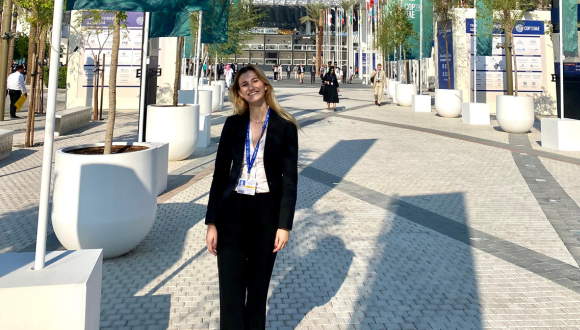
Fassbender attended last year’s COP28 conference, where she found that environmental diplomacy in the Middle East with Israel was still happening, just must more quietly.
Her first article in World Development specifically focused on environmental diplomacy between the United Arab Emirates (UAE) and Israel, and in particular highlighted the UAE’s role as a trust builder, facilitating collaborations between Israel and countries that might otherwise avoid direct engagement. One high-profile example was a tripartite agreement between Jordan, Israel, and the UAE, involving renewable energy and desalinated water.
Fassbender’s second article in Strategic Assessment delves into the impact of October 7 and the ongoing war on environmental diplomacy in the region. “Before October 7, climate cooperation was very public, with the UAE and Israel framing themselves as regional climate leaders,” she says.
“Afterwards, it became more subdued, but climate cooperation continued at a quieter level. Conferences like COP28 served as backdoor diplomatic channels where delegates could still meet and communicate.”
Fassbender’s research underscores both the promise and the vulnerability of environmental diplomacy, especially in a post-October 7 world. “Amid the destruction, pain and grievances across the region, it can be incredibly challenging to focus on climate cooperation,” she says. “However, it is crucial to keep these channels open—not only to maintain communication, but also to address the pressing environmental crises that affect us all.”
Interested to hear more?
Learn more about the international programs we offer, reach out to the Peace Index or Konrad Adenauer Program directly, or contact The Lowy International School’s Director of International Development to pursue other potential joint opportunities.
